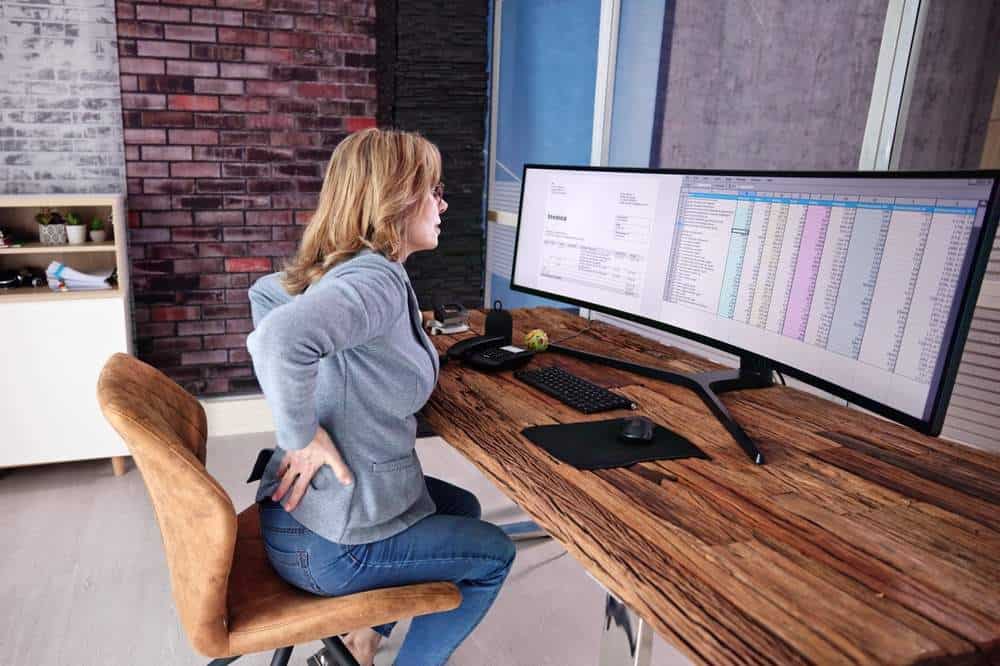Back pain is one of the most common reasons Americans visit the doctor each year. In fact, back pain can happen to people of all ages and lifestyles, ranging from a dull ache to a sharp, stabbing pain. Back pain can be debilitating and may significantly impact a person’s quality of life.
When back pain starts to affect your ability to work, exercise, or even go about your daily routines, it’s important to seek quality treatment and care so you can avoid the consequences of untreated back pain. Let’s explore the causes of back pain, how to recognize serious back pain, and what to do next.
Common Causes of Back Pain

A variety of factors, including poor posture, back injuries, herniated discs, arthritis, and osteoporosis, can cause back pain.
Poor Posture
Poor posture is one of the most common causes of back pain. Sitting or standing for extended periods of time can put pressure on the neck, back, and spine, resulting in pain and discomfort. Hunching your shoulders forward while at a desk or looking at your phone can also cause back pain.
Back Injuries
Back injuries can impact the spine, muscles, ligaments, nerves, and other structures that help support you. Whether you have suffered a car accident injury, sports injury, or a recent fall, inflammation, torn tissues, and other effects can result in back pain.
Herniated Disc
A herniated disc is a common spinal issue that can result in back pain and other symptoms like tingling and numbness. If a spinal disc that separates two vertebrae becomes cracked or torn, it can leave the vertebrae vulnerable and aggravate nearby nerves, causing painful symptoms.
Arthritis
There are many different types of arthritis, the most common of which is osteoarthritis. General wear and tear on the body over time can result in pain and stiffness in the joints, including the vertebrae of the spine.
Osteoporosis
Osteoporosis is a health condition in which bones become brittle and weak, which can make you more prone to broken bones or fractures.
When Is Back Pain Serious? Signs & Symptoms of Serious Back Pain
While back pain is a common symptom, certain warning signs can indicate a more serious underlying condition that needs to be addressed. If you experience any of the following symptoms along with back pain, it is important to seek medical treatment:
When Back Pain Comes with Weakness, Numbness, or Tingling in Arms or Legs
Back pain accompanied by numbness or tingling in the extremities can indicate a nerve problem. In these cases, tingling, numbness, and weakness may occur in the arms or legs, depending on where the underlying issue is located. Nerve damage can result in uncomfortable symptoms and chronic issues if left untreated.
When Back Pain Comes with Fever
Back pain with a fever may indicate a serious underlying condition, such as an infection. Infections like kidney infections or bone infections can result in both severe back pain and fever. Some types of cancer can also cause severe back pain and fever.
When Back Pain Causes Weight Loss
In some cases, back pain can cause weight loss because of an underlying condition. Unexplained weight loss, along with severe back pain, can be a sign of infection or certain health conditions like rheumatoid arthritis, osteoporosis, or even cancer.
When Back Pain Causes Joint Pain
Back pain can also cause joint pain, especially if you alter your posture or change your gait to compensate for the discomfort. When you experience back pain, you may naturally avoid certain postures or movements to avoid further aggravating the painful area. This can lead to additional stress and pressure on other joints, like the shoulders, hips, and knees.
When Back Pain Gets Worse at Night
Back pain can sometimes get worse at night for a number of reasons. Poor sleep posture can result in an increase in pain while trying to fall or stay asleep. A lack of activity during the day and a more sedentary lifestyle can result in stiffness that results in more pain and discomfort when lying down. Some degenerative conditions like degenerative disc disease may also have symptoms that include back pain that gets worse at night.
When Back Pain Comes with Loss of Bladder or Bowel Control
If you experience loss of bladder or bowel control along with severe back pain, then you might be dealing with a spine or spinal cord injury. Possible explanations for the connection between back pain and loss of control over the bladder or bowel include disruptions to damaged or compressed nerves that control these functions.
When Back Pain Doesn’t Improve with Rest
If you have been experiencing back pain for a few days, you might try resting and other home remedies to see if the pain will go away on its own. However, sometimes back pain will not improve with rest because there is an underlying condition that needs to be addressed.
What Are the Risk Factors of Back Pain?

Back pain is a common condition that affects people of all ages and backgrounds. However, here are some risk factors that can increase your chances of developing back pain:
Age
Natural wear and tear comes with aging, which can increase the risk of back pain.
Poor Posture
Slouching, hunching, and other types of poor posture can put additional stress and strain on the spine.
Physical Activity
Prolonged sitting or standing or activities that involve heavy lifting or repetitive motions can increase your chances of experiencing back pain.
Stress
Both emotional stress and physical stress can lead to increased muscle tension and trigger back pain.
Obesity
Being overweight or obese can put additional pressure on the spine and back, increasing the risk of back pain.
Smoking
Smoking impairs blood flow in the body, which can reduce the amount of oxygen and nutrients that reach the muscles and bones.
Genetics
Certain genetic factors can increase the risk of developing certain back conditions, such as herniated discs or spinal stenosis.
Medical Conditions
Certain medical conditions can increase the risk of back pain, including arthritis, osteoporosis, and fibromyalgia.
What Happens When Back Pain Goes Untreated?
If left untreated, back pain can have a significant impact on your overall quality of life. Back pain that lasts for weeks or months can become chronic, making it more difficult to manage over time. Back pain may also limit your ability to go about everyday activities and result in decreased mobility.
Over time, untreated back pain can cause you to compensate and negatively impact your physical health, like your posture, along with your mental health, leading to depression and anxiety. Back pain may also interfere with your ability to perform your job, resulting in missed days or decreased productivity.
How We Help Treat & Prevent Back Pain
At Pro-Care Medical Centers, we provide thorough diagnostics and treatment plans for a wide variety of back pain causes. Whether you are dealing with a recent car accident, back injury, or are managing chronic back pain, our doctors are here to help. Pro-Care treatment for back pain may include a combination of approaches, including ice, stretching, exercises, and active rehab.
We recognize that every case of back pain is unique and develop a treatment plan specifically for you to help you experience lasting relief and get back to your regular routines and activities. Schedule an appointment today at Pro-Care Center near you and get started on quality treatment for back pain.



